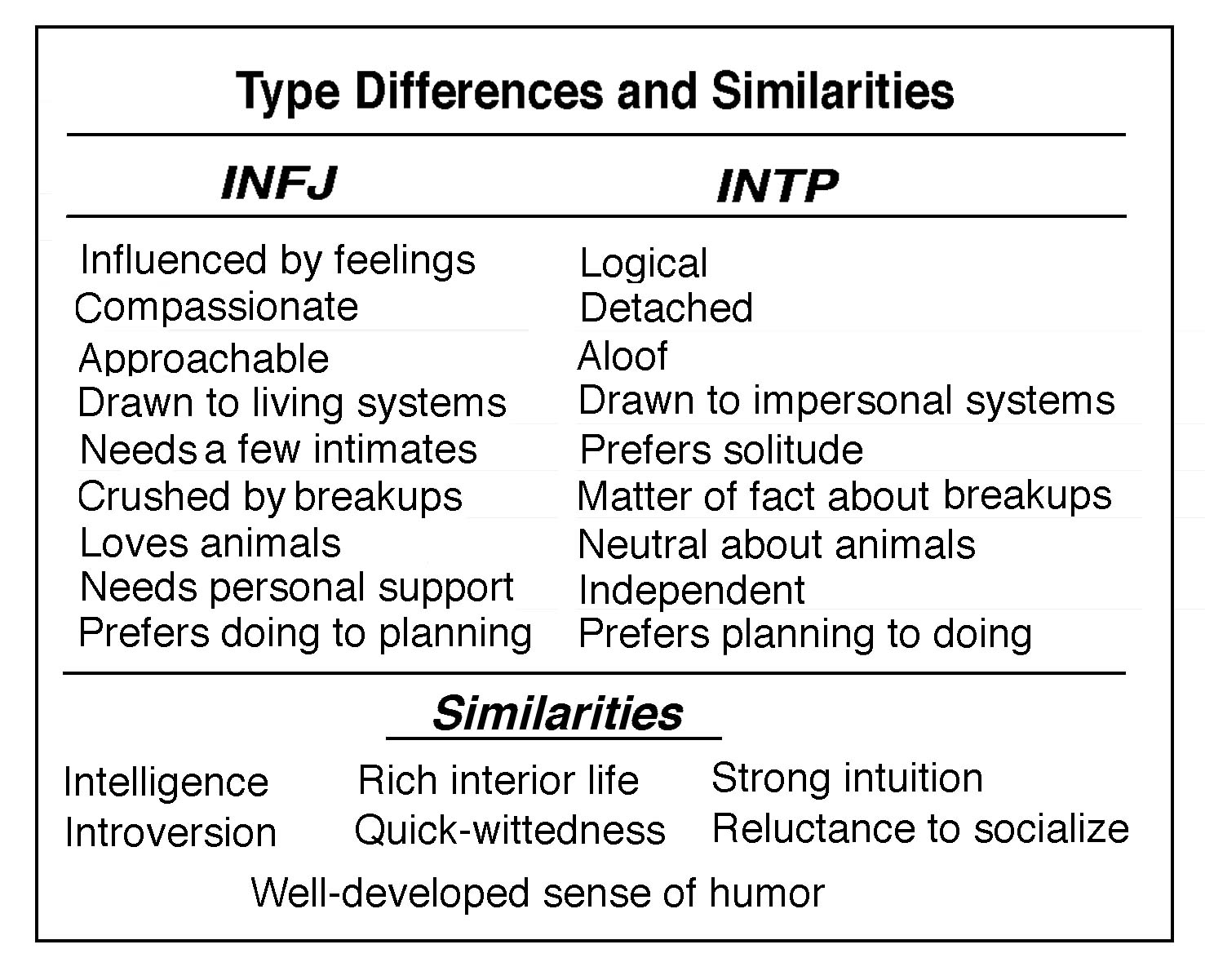INFJ meets INTP
- Aria Fox
- Infj , Isfj , Myers briggs personality types , Your secret self
- August 2, 2023
INFJs are often drawn to INTPs because of their intelligence and ability to apply logic to every situation. Eventually, though, INFJs tend to find most INTPs distant because of their unemotional approach to life. The INTP is attracted to INFJs because of their compassion and spontaneity. But the qualities that drew them to an INFJ in the first place can eventually get on their nerves. To them, it’s sloppy to let feelings override logic. Because they’re so reserved, INTPs may have few friends.
This personality type is more attuned to impersonal systems and technical subjects than intimate topics. If you’re an INFJ who’s an animal lover, don’t expect the INTP to share your emotional bond with pets. Are your favorite causes fueled more by compassion than logic?

Privacy and Space If you are close to an INTP, it’s important to give him or her plenty of space. INTPs need more time alone than other types. They don’t like being interrupted when they are focusing on something they’re doing. If their feelings are hurt, they won’t want to talk about it right away as INFJs do. They need time to process their feelings. Being pestered for a discussion of the problem only makes them more upset.
Small talk is not the forte of INTPs.
They want to discuss things that are important, amusing or thought-provoking.
They’d rather sit in silence than chat politely. Should the conversation turn to something they’re interested in, though, they can become long-winded and even boring. When apparently easy-going INTPs are challenged about their beliefs, they can be downright hard.
Friends sometimes get the impression that the INTP is aloof and judgmental. That’s because INTPs are impatient with faults both in themselves and others. When they’re critical of something you’ve done, they probably haven’t meant to hurt you. In their problem-solving mode, they’ve forgotten to consider your feelings. Their perfectionism causes them to be hard on themselves, too. Personal failure is likely to make them depressed. Because they have trouble opening up to others, they suffer alone. They may not even be clear about what they feel or why they’re depressed.
Work and Play The INTP’s mind may be organized, but his or her personal environment is not. INTPs make clear, logical plans to put things in order but seldom get around to it. Nothing changes and the mess remains.
INTPs need plenty of private time to read, think, work at their computers or watch television. They’re partial to solitary activities although they enjoy companionship at times. When they play games, they prefer bridge, Monopoly, chess or other challenges to their problem-solving skills. They talk very little as they play, preferring to concentrate on their moves. They’re also competitive. When they get involved in a project, they’re more interested in the planning phase than in the actual execution. If the project involves drudgery, their motivation evaporates and they put it off.
Falling in Love When INTPs fall in love, they fall hard. Passion consumes them. They step out of character—writing poetry, reading to their lover, and buying gifts. They ignore obstacles to romance such as distance, weather, and prior commitments. However, their common sense usually returns within a year. Even though they remain committed, they may seem to pull away and become more matter-of-fact. They still appreciate their partners; they just don’t talk much about their feelings. They’ve returned to their familiar pattern of solitude.
When INTPs fall out of love, the decision is almost always final. A line has been crossed.
The INTP allows the relationship to deteriorate and end, with no attempt to revive it. Break-ups can be messy, damaging the lives of many people.
Bottom Line INTPs strive for logical purity. They are clear and quick-thinking, never accepting ideas that don’t make sense to them even though everyone else might regard them as the truth. They’re good at connecting unrelated thoughts and put considerable effort into analyzing and solving problems. They don’t want the help of others. For this reason, most have a distaste for meetings. They’d rather come up with ideas on their own and make plans independently. They also have a strong need to continue learning about areas that interest them. They’re committed to the life of the mind. Many prolong their formal education for years.
